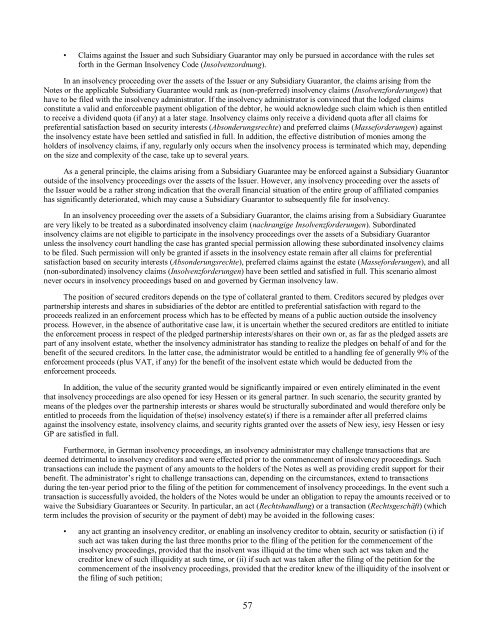iesy Repository GmbH - Irish Stock Exchange
iesy Repository GmbH - Irish Stock Exchange
iesy Repository GmbH - Irish Stock Exchange
Create successful ePaper yourself
Turn your PDF publications into a flip-book with our unique Google optimized e-Paper software.
• Claims against the Issuer and such Subsidiary Guarantor may only be pursued in accordance with the rules set<br />
forth in the German Insolvency Code (Insolvenzordnung).<br />
In an insolvency proceeding over the assets of the Issuer or any Subsidiary Guarantor, the claims arising from the<br />
Notes or the applicable Subsidiary Guarantee would rank as (non-preferred) insolvency claims (Insolvenzforderungen) that<br />
have to be filed with the insolvency administrator. If the insolvency administrator is convinced that the lodged claims<br />
constitute a valid and enforceable payment obligation of the debtor, he would acknowledge such claim which is then entitled<br />
to receive a dividend quota (if any) at a later stage. Insolvency claims only receive a dividend quota after all claims for<br />
preferential satisfaction based on security interests (Absonderungsrechte) and preferred claims (Masseforderungen) against<br />
the insolvency estate have been settled and satisfied in full. In addition, the effective distribution of monies among the<br />
holders of insolvency claims, if any, regularly only occurs when the insolvency process is terminated which may, depending<br />
on the size and complexity of the case, take up to several years.<br />
As a general principle, the claims arising from a Subsidiary Guarantee may be enforced against a Subsidiary Guarantor<br />
outside of the insolvency proceedings over the assets of the Issuer. However, any insolvency proceeding over the assets of<br />
the Issuer would be a rather strong indication that the overall financial situation of the entire group of affiliated companies<br />
has significantly deteriorated, which may cause a Subsidiary Guarantor to subsequently file for insolvency.<br />
In an insolvency proceeding over the assets of a Subsidiary Guarantor, the claims arising from a Subsidiary Guarantee<br />
are very likely to be treated as a subordinated insolvency claim (nachrangige Insolvenzforderungen). Subordinated<br />
insolvency claims are not eligible to participate in the insolvency proceedings over the assets of a Subsidiary Guarantor<br />
unless the insolvency court handling the case has granted special permission allowing these subordinated insolvency claims<br />
to be filed. Such permission will only be granted if assets in the insolvency estate remain after all claims for preferential<br />
satisfaction based on security interests (Absonderungsrechte), preferred claims against the estate (Masseforderungen), and all<br />
(non-subordinated) insolvency claims (Insolvenzforderungen) have been settled and satisfied in full. This scenario almost<br />
never occurs in insolvency proceedings based on and governed by German insolvency law.<br />
The position of secured creditors depends on the type of collateral granted to them. Creditors secured by pledges over<br />
partnership interests and shares in subsidiaries of the debtor are entitled to preferential satisfaction with regard to the<br />
proceeds realized in an enforcement process which has to be effected by means of a public auction outside the insolvency<br />
process. However, in the absence of authoritative case law, it is uncertain whether the secured creditors are entitled to initiate<br />
the enforcement process in respect of the pledged partnership interests/shares on their own or, as far as the pledged assets are<br />
part of any insolvent estate, whether the insolvency administrator has standing to realize the pledges on behalf of and for the<br />
benefit of the secured creditors. In the latter case, the administrator would be entitled to a handling fee of generally 9% of the<br />
enforcement proceeds (plus VAT, if any) for the benefit of the insolvent estate which would be deducted from the<br />
enforcement proceeds.<br />
In addition, the value of the security granted would be significantly impaired or even entirely eliminated in the event<br />
that insolvency proceedings are also opened for <strong>iesy</strong> Hessen or its general partner. In such scenario, the security granted by<br />
means of the pledges over the partnership interests or shares would be structurally subordinated and would therefore only be<br />
entitled to proceeds from the liquidation of the(se) insolvency estate(s) if there is a remainder after all preferred claims<br />
against the insolvency estate, insolvency claims, and security rights granted over the assets of New <strong>iesy</strong>, <strong>iesy</strong> Hessen or <strong>iesy</strong><br />
GP are satisfied in full.<br />
Furthermore, in German insolvency proceedings, an insolvency administrator may challenge transactions that are<br />
deemed detrimental to insolvency creditors and were effected prior to the commencement of insolvency proceedings. Such<br />
transactions can include the payment of any amounts to the holders of the Notes as well as providing credit support for their<br />
benefit. The administrator’s right to challenge transactions can, depending on the circumstances, extend to transactions<br />
during the ten-year period prior to the filing of the petition for commencement of insolvency proceedings. In the event such a<br />
transaction is successfully avoided, the holders of the Notes would be under an obligation to repay the amounts received or to<br />
waive the Subsidiary Guarantees or Security. In particular, an act (Rechtshandlung) or a transaction (Rechtsgeschäft) (which<br />
term includes the provision of security or the payment of debt) may be avoided in the following cases:<br />
• any act granting an insolvency creditor, or enabling an insolvency creditor to obtain, security or satisfaction (i) if<br />
such act was taken during the last three months prior to the filing of the petition for the commencement of the<br />
insolvency proceedings, provided that the insolvent was illiquid at the time when such act was taken and the<br />
creditor knew of such illiquidity at such time, or (ii) if such act was taken after the filing of the petition for the<br />
commencement of the insolvency proceedings, provided that the creditor knew of the illiquidity of the insolvent or<br />
the filing of such petition;<br />
57

















